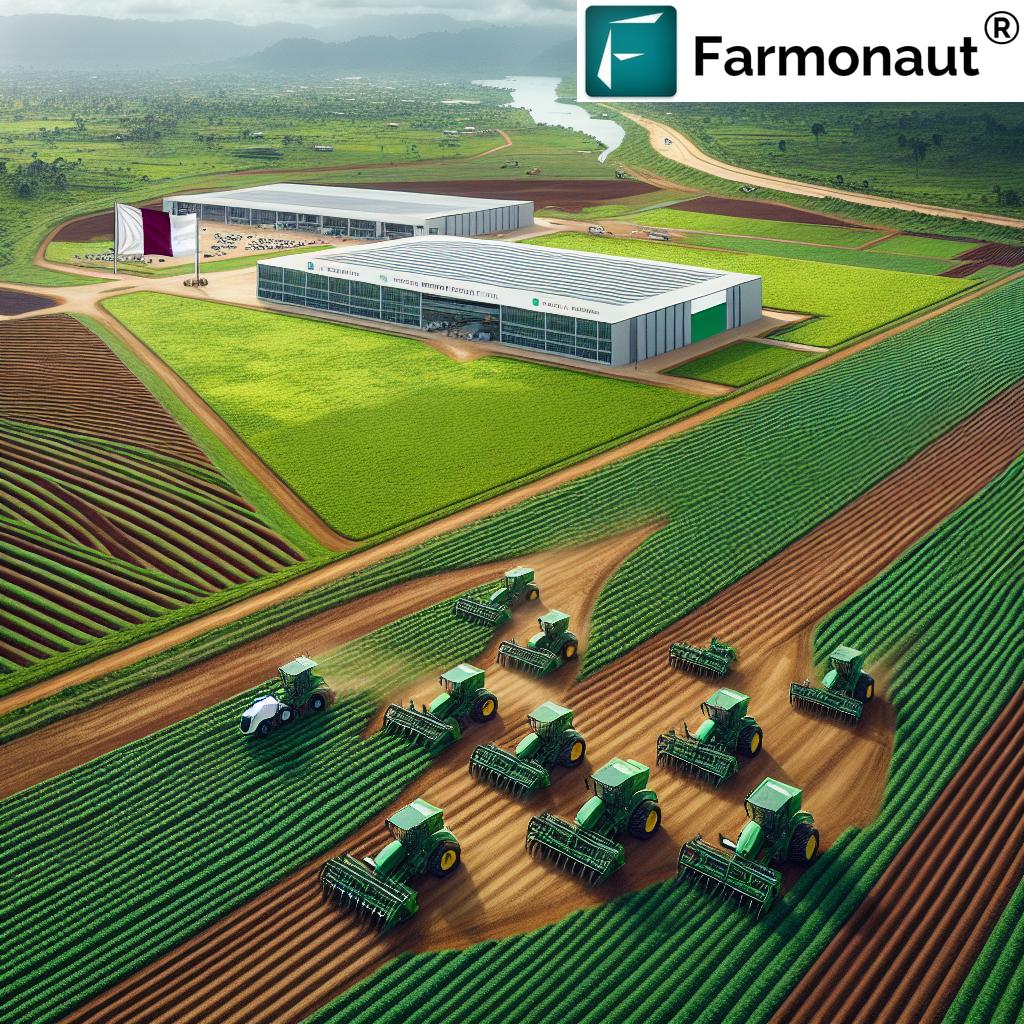Sierra Leone-Qatar Partnership: Unlocking Agricultural Investment Opportunities and Economic Growth
“Sierra Leone boasts over 5.4 million hectares of arable land, offering vast agricultural investment opportunities for Qatari investors.”
In the realm of international diplomacy and economic cooperation, we are witnessing a significant development that promises to reshape the landscape of West African agriculture and investment. The establishment of Sierra Leone’s embassy in Qatar marks a pivotal moment in the bilateral relations between these two nations, opening new avenues for collaboration and mutual growth. As we delve into this partnership, we’ll explore the myriad opportunities it presents, with a particular focus on the agricultural sector and the potential for transformative investment.
The Dawn of a New Diplomatic Era
The inauguration of the Sierra Leone embassy in Doha on February 18 represents more than just a diplomatic formality. It symbolizes the culmination of years of growing ties and the beginning of a new chapter in Qatar-Sierra Leone relations. H.E. Ahmed Tejan Fadlu-Deen, the first Ambassador of Sierra Leone to Qatar, brings a fresh perspective to this role, coming from a background in the private sector rather than traditional diplomacy.
This unique approach aligns perfectly with the innovative spirit that both nations are embracing in their partnership. Ambassador Fadlu-Deen’s experience in business is expected to be a valuable asset in fostering economic cooperation and attracting foreign direct investment (FDI) to Sierra Leone.

Building on a Foundation of Cooperation
The Qatar-Sierra Leone bilateral partnership is not starting from scratch. Over the past four decades, Qatar has been actively involved in various development initiatives in Sierra Leone through the Qatar Fund for Development (QFFD). These projects have spanned crucial sectors such as education, healthcare, agriculture, and infrastructure, laying a solid foundation for future collaboration.
With the embassy now operational, we anticipate an acceleration in the pace and scale of cooperation. The formalized diplomatic presence will facilitate more direct communication channels, enabling both countries to identify and capitalize on synergies across various sectors.
Agriculture: The Golden Opportunity
Among the multitude of investment opportunities in Sierra Leone, agriculture stands out as a sector with immense potential. The country’s vast tracts of arable land, coupled with a favorable climate, make it an ideal destination for agricultural investment. For Qatari investors looking to diversify their portfolios and contribute to food security initiatives, Sierra Leone’s agricultural sector offers a compelling proposition.
Here’s why agriculture in Sierra Leone is attracting attention:
- Abundant Resources: With over 5.4 million hectares of arable land, much of which is underutilized, there’s significant room for expansion and development.
- Diverse Crop Potential: The country’s climate supports a wide range of crops, from staple foods to high-value export commodities.
- Growing Demand: Both domestic and international markets show increasing demand for agricultural products, ensuring a ready market for produce.
- Government Support: The Sierra Leonean government is actively promoting agricultural investment through various incentives and policy reforms.
To maximize the potential of this sector, innovative technologies and modern farming practices are essential. This is where companies like Farmonaut come into play, offering cutting-edge solutions that can transform traditional farming methods.
Farmonaut: Revolutionizing Agriculture with Technology
In the context of modernizing Sierra Leone’s agricultural sector, Farmonaut’s satellite-based farm management solutions could play a crucial role. By leveraging advanced technologies such as satellite imagery, artificial intelligence, and blockchain, Farmonaut provides tools that can significantly enhance agricultural productivity and sustainability.
Some key features of Farmonaut’s platform that could benefit Sierra Leone’s agricultural development include:
- Satellite-Based Crop Health Monitoring: Real-time insights into vegetation health and soil moisture levels can help farmers make informed decisions about irrigation and crop management.
- AI-Driven Advisory System: Personalized recommendations based on data analysis can guide farmers in optimizing their practices for better yields.
- Blockchain-Based Traceability: Ensuring transparency in the agricultural supply chain, which is crucial for building trust with international partners and consumers.
- Resource Management Tools: Efficient management of agricultural resources can lead to cost savings and improved sustainability.
For more information on how these technologies can be applied, interested parties can explore Farmonaut’s offerings through their web application or mobile apps available on Google Play and the App Store.
Investment Landscape in Sierra Leone
While agriculture presents a golden opportunity, it’s far from the only sector ripe for investment in Sierra Leone. The country’s rich natural resources, strategic location, and ongoing development initiatives create a diverse investment landscape. Here’s a comprehensive look at the investment opportunities across various sectors:
| Sector | Investment Potential | Key Advantages | Estimated ROI (%) |
|---|---|---|---|
| Agriculture | High | Abundant arable land, favorable climate, government support | 15-25 |
| Mining | High | Rich mineral deposits (diamonds, gold, iron ore), established industry | 20-30 |
| Infrastructure | Medium | Growing demand, government prioritization, potential for PPPs | 10-20 |
| Tourism | Medium | Pristine beaches, rich cultural heritage, untapped potential | 12-18 |
| Energy | High | Renewable energy potential, government incentives | 18-25 |
| Fisheries | Medium | Extensive coastline, abundant marine resources | 15-22 |
“Qatar’s GDP per capita of $61,276 is over 100 times higher than Sierra Leone’s $509, highlighting potential for economic cooperation.”
Challenges and Opportunities
While the potential for investment in Sierra Leone is significant, it’s important to address the challenges that investors may face. Ambassador Fadlu-Deen acknowledges these concerns and emphasizes the need for a cautious and calculated approach to investments. Some of the key challenges include:
- Infrastructure Development: Improving transportation and logistics networks to support business operations.
- Regulatory Environment: Ensuring clear and consistent regulations to protect investor interests.
- Skilled Workforce: Developing local talent to support advanced agricultural and technological initiatives.
- Access to Finance: Facilitating access to capital for both local and international investors.
To address these challenges, the Sierra Leonean government is taking proactive steps, including:
- Offering tax incentives and breaks to attract foreign investment.
- Streamlining the investment process through the National Investment Board.
- Investing in education and vocational training to build a skilled workforce.
- Exploring public-private partnerships to accelerate infrastructure development.
The Role of Technology in Agricultural Development
As we look to the future of agriculture in Sierra Leone, the integration of technology will play a pivotal role in unlocking the sector’s full potential. Advanced agricultural technologies can help overcome traditional challenges and boost productivity. Here’s how technology can transform Sierra Leone’s agricultural landscape:
- Precision Agriculture: Using satellite imagery and data analytics to optimize crop management.
- Smart Irrigation Systems: Implementing water-efficient irrigation techniques to conserve resources.
- Blockchain for Supply Chain: Ensuring transparency and traceability in agricultural products.
- Mobile Banking and Fintech: Improving access to financial services for rural farmers.
Farmonaut’s suite of tools aligns perfectly with these technological needs. Their API and developer documentation provide resources for integrating advanced agricultural technologies into existing systems and workflows.
Building Sustainable Partnerships
The success of the Sierra Leone-Qatar partnership will depend on building sustainable, mutually beneficial relationships. Ambassador Fadlu-Deen emphasizes the importance of trust-building and aligning policies before embarking on significant projects. This approach ensures that investments are not only profitable but also contribute to the long-term development of Sierra Leone.
Key areas for sustainable partnerships include:
- Knowledge Transfer: Sharing expertise in areas such as agricultural technology and infrastructure development.
- Capacity Building: Investing in training and education to develop local skills and expertise.
- Environmental Sustainability: Ensuring that agricultural and industrial development aligns with environmental conservation goals.
- Community Engagement: Involving local communities in development projects to ensure broad-based benefits.
The Future of Qatar-Sierra Leone Cooperation
As we look to the future, the Qatar-Sierra Leone partnership holds immense promise. The establishment of the embassy in Doha is just the beginning of what we anticipate will be a fruitful and dynamic relationship. Some key areas of future cooperation include:
- Agricultural Innovation: Joint research and development initiatives to enhance agricultural productivity.
- Education and Training: Exchange programs and scholarships to build capacity in key sectors.
- Sports Development: Leveraging Qatar’s expertise to enhance Sierra Leone’s sports infrastructure and talent development.
- Energy Sector Collaboration: Exploring opportunities in renewable energy and sustainable resource management.

Conclusion: A Partnership for Prosperity
The Sierra Leone-Qatar partnership represents a significant opportunity for both nations to leverage their respective strengths and drive economic growth. For Sierra Leone, it offers the chance to attract much-needed investment and expertise to develop its vast potential, particularly in the agricultural sector. For Qatar, it provides an avenue for diversifying investments and contributing to global food security initiatives.
As this partnership evolves, the role of innovative technologies and sustainable practices will be crucial. Companies like Farmonaut, with their advanced agricultural solutions, are well-positioned to contribute to this transformation. By combining Qatar’s financial resources and technological expertise with Sierra Leone’s natural wealth and human capital, we can create a model of international cooperation that benefits both nations and sets a precedent for North-South partnerships.
The journey ahead is filled with both challenges and opportunities. However, with careful planning, mutual respect, and a commitment to sustainable development, the Sierra Leone-Qatar partnership has the potential to become a beacon of success in international relations and economic development.
FAQ Section
Q: What are the main sectors for investment in Sierra Leone?
A: The main sectors for investment include agriculture, mining, infrastructure, tourism, energy, and fisheries. Agriculture and mining are particularly promising due to the country’s natural resources and arable land.
Q: How is technology expected to impact agriculture in Sierra Leone?
A: Technology is expected to revolutionize agriculture in Sierra Leone through precision farming techniques, satellite-based crop monitoring, AI-driven advisory systems, and blockchain for supply chain transparency. These innovations can significantly improve productivity and sustainability.
Q: What incentives does Sierra Leone offer to foreign investors?
A: Sierra Leone offers various incentives to foreign investors, including tax breaks, access to regional trade agreements, and support through the National Investment Board. The government is also working on improving the regulatory environment to attract more FDI.
Q: How can Qatari investors get involved in Sierra Leone’s agricultural sector?
A: Qatari investors can explore opportunities in large-scale farming, agro-processing, and agricultural technology. They can partner with local farmers, invest in modernizing farming practices, or contribute to developing agricultural infrastructure.
Q: What role does the new Sierra Leone embassy in Qatar play in fostering investment?
A: The embassy serves as a crucial link between the two countries, facilitating communication, promoting investment opportunities, and providing support to potential investors. It plays a key role in building trust and understanding between the business communities of both nations.
Earn With Farmonaut: Affiliate Program
Earn 20% recurring commission with Farmonaut’s affiliate program by sharing your promo code and helping farmers save 10%. Onboard 10 Elite farmers monthly to earn a minimum of $148,000 annually—start now and grow your income!
Farmonaut Subscriptions
As we conclude this exploration of the Sierra Leone-Qatar partnership and its potential for agricultural investment and economic growth, it’s clear that the future holds exciting possibilities. With the right approach, leveraging technology, and fostering sustainable practices, this collaboration can serve as a model for international cooperation and development. The journey ahead is promising, and we look forward to witnessing the fruits of this burgeoning partnership.



